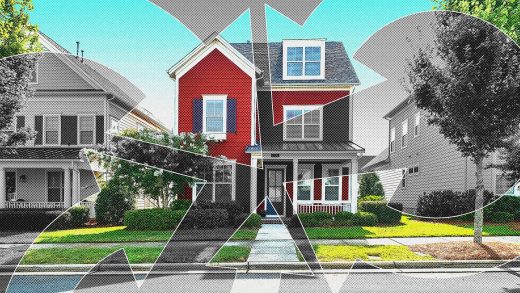Can’t afford a house? A new startup connects buyers to investors who can help
Can’t afford a house? A new startup connects buyers to investors who can help
Ownify launched in Raleigh, North Carolina, but has plans to expand to more U.S. cities soon.
BY Adele Peters
When George and Lydia House decided they wanted to buy a home near Raleigh, North Carolina, last year, they were entering a competitive market. Like most of the U.S., the area doesn’t have enough homes to meet demand. The couple had another challenge: Because they’d recently started new jobs, they couldn’t easily get a mortgage.
“We hadn’t been in our jobs for more than two years, so the mortgage company wouldn’t hear us out,” Lydia House says.
Their realtor suggested they try a new option: working with a company that connects buyers with investors. They’d pay 2% down, and an investor group would pay for the rest. They’d make monthly payments to the investor to increase their equity little by little. In around five years, they’d have enough equity, around 10%, to sell and then qualify for a regular mortgage, which they could use to buy the house at the current market rate.
The startup that offers the program, called Ownify, describes the model as buying a house brick by brick. “We fractionalize the equity or the value of the home into 10,000 bricks,” says Frank Rohde, founder of Ownify. “So if you buy a $400,000 home, each brick is worth $40 on day one. And then we effectively create a co-investment where the customer buys 200 bricks on day one.”
Each month, the customer buys roughly 13 more “bricks,” through a fixed payment plan, though they can move faster or slower if they want. “You have flexibility to go at your own pace,” Rohde says. “You have the ability to build equity in the home. But you don’t have this large mortgage balance that potentially drags you down or creates this proportionate payment burden on a monthly basis.”
When they’ve built enough equity to get a mortgage, the occupants can buy the house from the company without any competitors. If they want to leave earlier, they can also choose to sell the equity back and move.
It’s different from rent-to-own models. Divvy, another startup, takes an extra payment from customers each month that goes to “savings” for a house, rather than equity—in a model that seems exploitative under close examination. Ben Herold, Ownify’s cofounder, used to work at Divvy himself, so there’s reason to be skeptical. But in theory, this new model could help make home buying more accessible.
Rohde previously founded and sold a company called Nomis Solutions, which helps lenders price and negotiate mortgages. “We were ingesting a ton of mortgage application and approval data, and I started seeing in the data that more and more first-time buyers are getting squeezed out,” he says.
The first problem is the nationwide housing shortage—the country needs around 6 million more homes, by some estimates, to meet demand. As he studied the data, Rohde also noticed that the high level of student debt is making it harder for buyers to save for a down payment. An increasing number of corporations are purchasing single-family homes to turn into rentals, adding to the competition.
“The win rate for first-time buyers kept going lower and lower and lower, down to the point where the average first-time buyer in some markets was making 13, 14, 15 offers before they would win their first accepted offer,” he says, noting that he asked mortgage companies what they were doing to address the problem, but realized that it wasn’t something they were trying to solve. “That really led to the genesis of the idea: Is there a different way in which we can think about home ownership?”
While it’s possible to get a mortgage with a very low down payment, that leaves the buyer with high monthly payments. Ownify’s model keeps monthly payments lower while still earning money for the investors who participate. Like a landlord, it provides repairs if the house needs maintenance.
Customers working with the company go through an approval process and are given a budget. When they find a house they like, the company makes an offer on it. “If someone likes a house that’s $330,000, we can go in and make an all-cash offer with a two-week close for $340,000 or $345,000,” Rohde says. “That helps the buyer compete.”
George and Lydia House succeeded in getting the first home they liked, in a city near Raleigh called Clayton, despite the fact that there were five other offers. “We looked at the house, put in an offer the next day, and on Monday we found out that we actually won the bid,” says George House. They moved in last October. “We love it,” he says, noting that the monthly cost is a little more than they previously paid in rent, but it’s worth it.
Ownify launched first in the Raleigh metro area because it has starter homes in the $300,000 to $400,000 range. “Our product doesn’t work in San Francisco,” Rohde says. Raleigh is also a strong market because it has good jobs and people moving to the region.
Nashville will come next, then Denver, and then potentially California’s Inland Empire or Central Valley. “Eventually I want to scale this to really be across the country,” Rohde says. “To say you can buy a home the traditional way with a mortgage, the way we’ve done it for 70, 80 years now or, if you want, you can buy it through fractional ownership as equity.”
Correction: An earlier version of this story misstated a quote from Rhode about the process of building equity in one of Ownify’s home.
ABOUT THE AUTHOR
Fast Company
(8)



